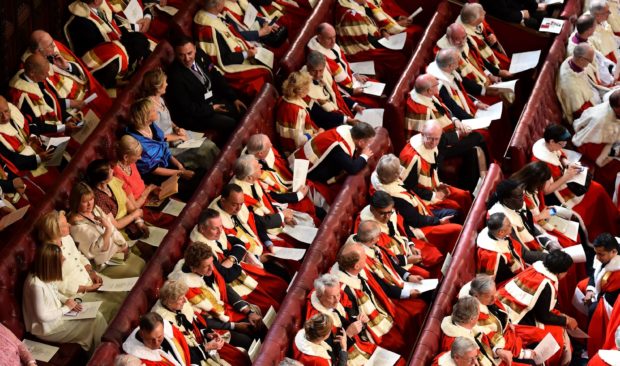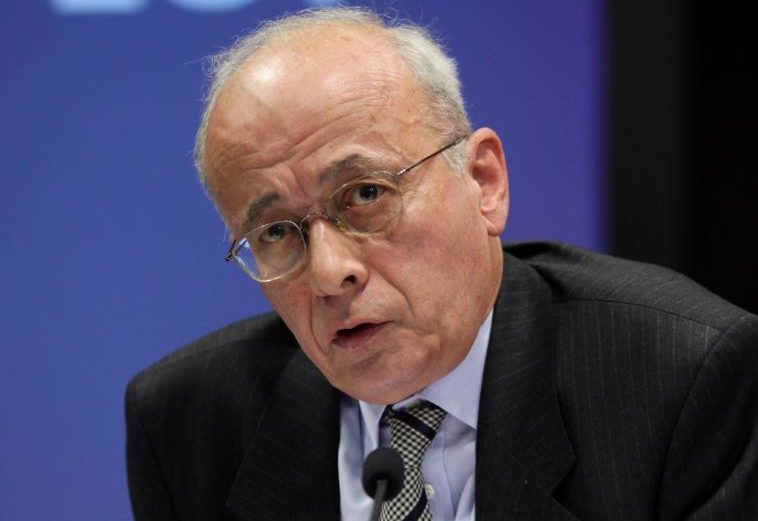The SNP should have taken seats in the House of Lords to defend Scotland against food safety concerns arising from EU withdrawal, the architect of Article 50 has suggested.
Lord Kerr of Kinlochard suggested devolution was being “overridden” by the UK Government’s controversial Brexit legislation but argued the SNP’s absence from the Lords meant Nicola Sturgeon’s party had limited its ability to fight against it.
The Scottish peer, who was born in Grantown-on-Spey, has been highly critical of Boris Johnson’s Internal Market Bill, which is a key part of a Brexit process and attempts to ensure goods can move easily between the four nations of the UK.
The Internal Market Bill has been mired in controversy since Northern Ireland Secretary Brandon Lewis admitted it broke international law when faced with criticism that it undermines the EU Withdrawal Agreement.
But Lord Kerr expressed concern about the impact the legislation will have on devolution claiming it “rode roughshod” over previous frameworks developed by the UK and Scottish Governments to protect the movement of goods within the UK.
He also criticised the SNP saying the Nationalists’ failure to take seats in the House of Lords had prevented the party from doing all it can to protect Scottish interests against the legislation.
Lord Kerr was part of the European Convention which drafted Article 50 of the Lisbon Treaty, the legal mechanism by which a member state can leave the EU. A prominent Remainer, he was also a former UK Permanent Representative to the EU.
The SNP objects to the Internal Market legislation arguing it gives Westminster a veto, which means devolved administrations would still have to accept goods from other parts of the UK, even if they have set different standards locally.
The SNP has always refused to send anybody to the House of Lords which I think is a great problem.”
Lord Kerr of Kinlochard
Lord Kerr revealed he has sympathy with some of the SNP’s concerns.
“Take standards for foodstuff sales for example,” Lord Kerr said. “If it is the UK Government that is setting the standards, insisting on the standards and is affected by its negotiations with people like the United States, you could have lower standards for food safety imported, even although food safety was devolved to the Holyrood Parliament.
“You could have a sort of race to the bottom if the dominant situation in the UK Government were to be trying to get free trade deals with third countries which have lower standards.”
But the crossbench peer said the lack of SNP representation in the House of Lords meant it was less likely that his Upper Chamber colleagues would be able to combat that particular aspect of the Bill.
SNP’s attitude towards the Lords described as “great pity”
“There will be plenty of people (peers) who say, as I do, that I think this overrides elements of the devolution settlement,” Lord Kerr said. “But I think the House of Lords will be less likely to overturn this than it is to overturn the Withdrawal Agreement override.
“This is for a number of reasons, one of which is the SNP has always refused to send anybody to the House of Lords which I think is a great problem. I think it was a mistake. I think if it is in order for the SNP to be represented in the House of Commons then I don’t understand the point of principle.
“They are not on the same line as Sinn Fein which is not represented in the House of Commons or the House of Lords. I don’t understand a feeling that the House of ‘Lairds’ is undemocratic and so on should override the obvious interest in Scotland being represented as best as possible in the House of Lords.”
Lord Kerr added: “Plaid Cymru from Wales is well represented in the House of Lords and will be very noisy on this aspect of this Bill. But in Scotland you are looking to independents like me or ex-Court of Session judges who will be very interested in the conflict on this and the devolution act. But I personally, although I’m not a member of the SNP, think it is a great pity that the SNP hasn’t sent anybody to the House of Lords.”
The SNP has never nominated anyone for the Lords on the point of principle that the party does not believe in an unelected Upper House.
The shocking reality is that the House of Lords has more of a say on Scotland’s future than the Scottish Parliament. That’s completely unacceptable, and makes a mockery of the democratic process altogether.”
SNP MSP Gillian Martin
The SNP’s Gillian Martin, Aberdeenshire East MSP, said: “The idea of an unelected legislature in the 21st century is ridiculous enough – but the shocking reality is that the House of Lords has more of a say on Scotland’s future than the Scottish Parliament.
“That’s completely unacceptable, and makes a mockery of the democratic process altogether.
“The people of Scotland must have the choice of a better future – rather than the broken Westminster system, and unprecedented attack on devolution, which is currently being imposed upon us by a Tory government we didn’t vote for.”
On the issue of food standards, Scottish Secretary Alister Jack wrote to Ms Sturgeon last week defending the UK Government against the charge that the legislation would have an adverse effect on food safety.
He said the UK was a “world leader” in environmental standards and that would not change. Mr Jack added that the UK Government and devolved administrations had agreed a common framework on food and feed safety hygiene law, guaranteeing a “shared commitment” to high standards.
Mr Jack told Ms Sturgeon that her government was “never less convincing” than when it purported to “champion a system it unashamedly wishes to overthrow”, adding that independence would “destroy” devolution
Lord Kerr has already been outspoken in his criticism of the aspect of the legislation which appears contrary to the Withdrawal Agreement which came into effect at the beginning of the year.
Specifically, Lord Kerr has been among those who objected to the part of the legislation which says ministers could have the power to “disapply” previously agreed rules on the movement of goods under the so-called Northern Ireland protocol.
The Northern Ireland protocol aimed to avoid the introduction of a hard border on the island of Ireland in the event of a no-deal Brexit. It stated that Northern Ireland would remain part of the UK’s customs territory so its goods would be included when the UK signs a free trade deal with another country. At the same time, Northern Ireland would have to stick to some EU rules to allow goods to move freely into the Irish Republic.
Lord Kerr told the House of Lords that the UK was acting like a “rogue state” through its willingness to rip up the Withdrawal Agreement.
Speaking to the Press and Journal, he described the UK Government’s behaviour as “shocking” and “unprecedented”.
The complicated question of Scottish independence
As someone who campaigned for a No vote in the 2014 Scottish independence referendum on the grounds that it would protect Scotland’s relationship with Europe, Lord Kerr also admitted Brexit had forced him to think hard about his stance.
“We’ve left the European Union, so my position needs a lot of thinking about. If there was another independence referendum, I don’t know where I’d be now,” Lord Kerr said.
“I believe that we shouldn’t have to choose between being Scottish and British and European. It should be possible to be all three. It seemed it’s not possible to be all three.
“So now one has to choose between being Scottish and British or Scottish and European. I’m not telling you I’ve stopped being a Unionist. I’m just saying it has all become a lot more complicated for people like me.”


